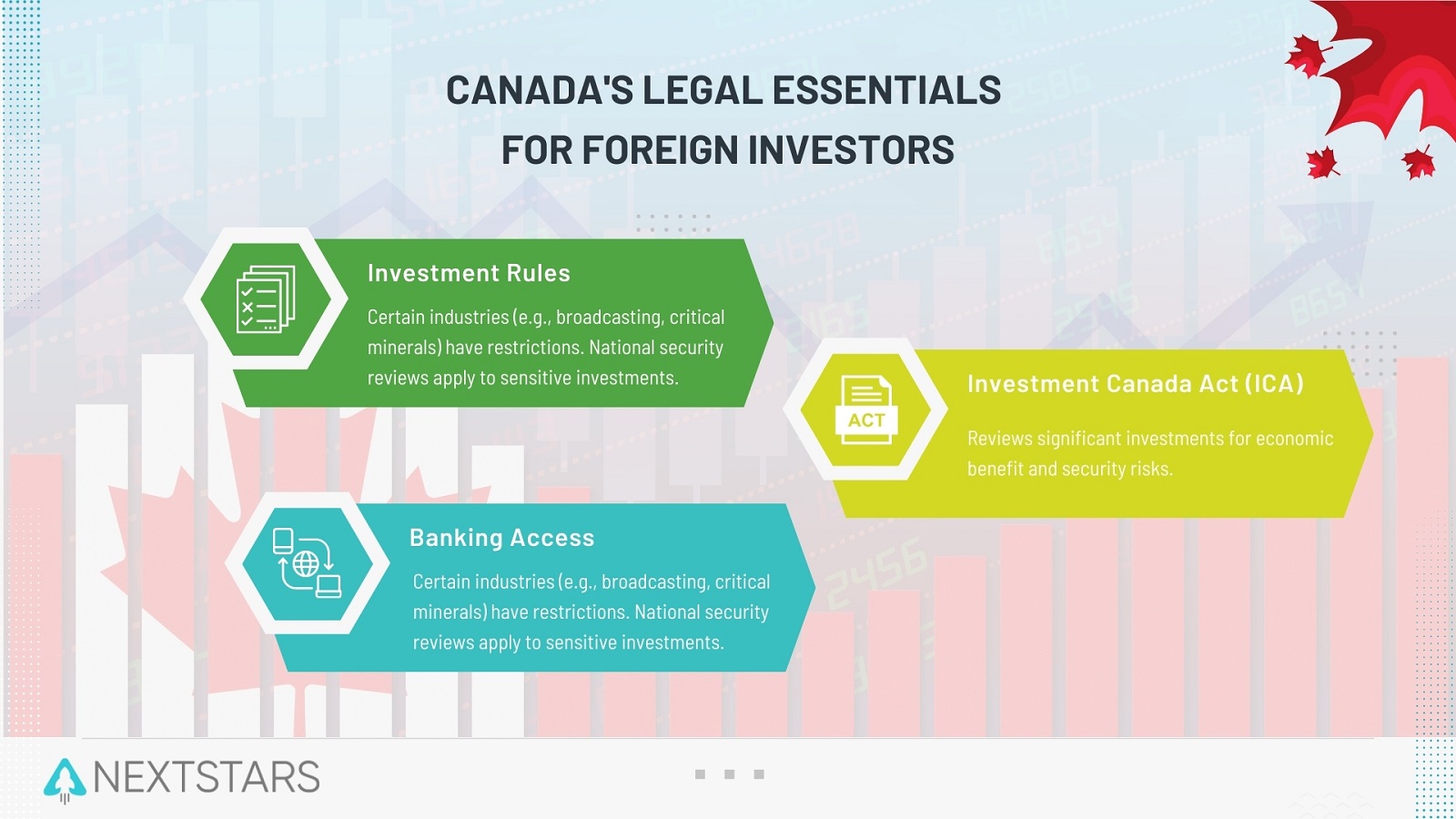Foreign investment plays a crucial role in Canada’s economic landscape, significantly contributing to growth and job creation. As of 2023, the stock of foreign direct investment (FDI) in Canada reached $1.263 trillion, marking a 6.0% increase from the previous year. Statistics Canada
The United States remains the leading source of FDI, accounting for 45.7% of the total, with holdings amounting to $618.2 billion in 2023. Statistics Canada
Canada’s openness to foreign investment is further highlighted by its ranking among G20 countries. In 2022, Canada had the second-largest FDI stock to GDP ratio, underscoring its attractiveness to international investors. Global Affairs Canada
This welcoming environment is supported by a stable political climate, a skilled workforce, and a robust legal framework, making Canada a favorable destination for foreign entrepreneurs and investors.
However, it’s essential for potential investors to understand the legal and regulatory landscape to ensure compliance and maximize the benefits of investing in Canada.
Here’s an overview of the key legal and regulatory considerations for foreign investors:
1. Can I Invest in Canada as a Foreigner?
Yes, Canada welcomes foreign entrepreneurs and investors across various sectors, including real estate, businesses, and financial markets. However, certain investments may be subject to review under the Investment Canada Act (ICA) to ensure they provide a net benefit to the country. Institute of Statistical Education Global Affairs Canada
2. Are There Restrictions or Rules Specific to Foreign Investors in Canada?
While Canada is open to foreign investment, specific regulations apply:
- Sector-Specific Restrictions: Certain industries, such as cultural businesses, telecommunications, and transportation, have specific limitations on foreign ownership. For example, the Broadcasting Act restricts broadcasting licenses to Canadian entities. Wikipedia
- National Security Considerations: Investments that could pose national security concerns are subject to review, regardless of their value. Recent amendments to the ICA have strengthened the government’s ability to scrutinize such investments. Government of Canada
- Critical Minerals Sector: Investments in Canada’s critical minerals sector face heightened scrutiny, especially those involving state-owned enterprises. The government has set a high bar for approving large mergers and acquisitions in this sector, reflecting its strategic importance. Reuters
3. What Is the Investment Canada Act, and How Does It Impact Foreign Investors?
The Investment Canada Act (ICA) is federal legislation that governs foreign investment in Canada. Its primary objectives are to:
- Review Significant Investments: The ICA mandates the review of significant foreign investments to determine if they are likely to result in a net benefit to Canada. Factors considered include economic impact, employment, resource processing, and compatibility with national policies.
- National Security Reviews: The Act empowers the government to review any foreign investment that may pose a threat to national security, regardless of the investment’s size or sector. This ensures that foreign control does not compromise Canada’s security interests. Institute of Statistical Education
- Compliance Requirements: Foreign investors may be required to submit detailed information and adhere to specific conditions to gain approval. Non-compliance can lead to legal consequences, including the unwinding of transactions. Government of Canada
4. As a Foreigner, Can I Open a Bank Account and Transfer Money to Canada?
Yes, non-residents can open bank accounts in Canada, though policies vary by institution. Generally, you’ll need to provide identification, such as a passport, and may need to visit a branch in person. Transferring money to Canadian banks is straightforward, but be aware of regulations:
- Reporting Requirements: International electronic funds transfers of $10,000 or more have to be reported to the Canada Revenue Agency (CRA) to combat money laundering and terrorist financing. Government of Canada
- Fees and Exchange Rates: Banks and money transfer services may charge fees and offer varying exchange rates. It’s advisable to compare options to minimize costs. Government of Canada
In summary, while Canada offers a welcoming environment for foreign entrepreneurs and investors, it’s essential to be aware of and comply with the legal and regulatory requirements, particularly those outlined in the Investment Canada Act. Engaging with legal and financial advisors familiar with Canadian regulations is advisable to navigate the investment process effectively.





